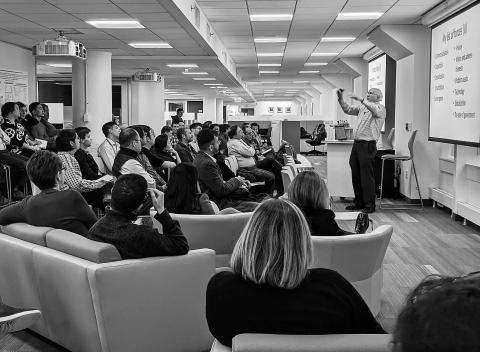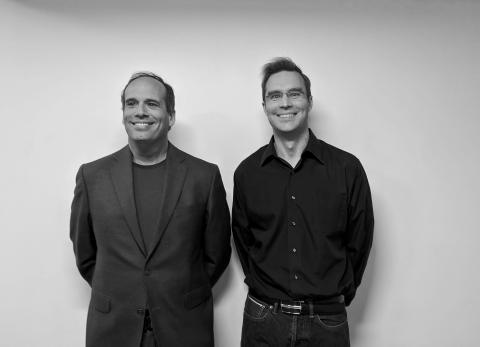Upcoming Events
Past Events
Landmark Ideas Series
January 20, 2022 at 4:00PM - 5:30PM
Clinical research is undergoing a major shift, as regulators and sponsors move towards continuous evidence generation to study how interventions perform over time. In this talk, we’ll explore what’s accelerating this trend, how new tools and technologies are advancing the space, and how it can ultimately enable more personalized care.
BCH AI & Machine Learning Working Group
December 14, 2021 at 2:00PM - 3:00PM
Dr. Wallace will talk about their work in text summarization and simplification, and issues related to factual accuracy of generated texts: - https://arxiv.org/abs/2104.05767- https://arxiv.org/abs/2008.11293
BCH AI & Machine Learning Working Group
November 30, 2021 at 2:00PM - 3:00PM
Dr. Eran presented her paper in Nature Medicine entitled "A multidimensional precision medicine approach identifies an autism subtype characterized by dyslipidemia": https://www.nature.com/articles/s41591-020-1007-0.
Landmark Ideas Series
November 15, 2021 at 4:00PM - 5:30PM
In May 2020, I co-authored a preprint that asked whether SARS-CoV-2 might have emerged naturally or from a lab. The preprint propelled me into an unpredictable year-and-a-half journey of searching for the origin of Covid-19. In May 2021, I agreed to write down what I had learnt in a book that will be released on November 16, VIRAL: The Search for the Origin of Covid-19. In this Landmark talk, I will discuss the role of scientists in the investigation of how SARS-CoV-2 emerged in Wuhan in late 2019. I will also describe the available data relevant to the origin of Covid-19, and how scientists can and must play an important role in what is possibly the most important mystery of our generation. This virus will be with us forever. We need to know where it came from.
Landmark Ideas Series
October 7, 2021 at 4:00PM - 5:30PM
Dr. Stephen Wolfram – creator of Mathematica, Wolfram|Alpha and the Wolfram Language; the author of A New Kind of Science; the originator of the Wolfram Physics Project; and the founder and CEO of Wolfram Research – will speak about the computational future and biomedicine. Dr. Wolfram will share a roadmap for recentering biomedicine around computation and give insights into harnessing data driven science to transform the biomedical landscape. This should be a relevant and an illuminating talk from one of the foremost leaders in computational health.
Frontline Dispatch Series
September 23, 2021 at 4:00PM - 5:30PM
Dr. Aaron Kesselheim, former member of the FDA’s Peripheral and Central Nervous System Drugs Advisory Committee who resigned over the agency’s approval of Aducanumab, will speak about the FDA’s accelerated approval pathway, how it is implemented, and how it was applied in the controversial Aducanumab case – which he dubbed the “worst drug approval decision in recent U.S. history.” Dr. Kesselheim will also give suggestions for the future. This should be a fascinating talk with wide implications for all future accelerated drug approval pathways.
BCH AI & Machine Learning Working Group
September 17, 2021 at 09:30AM - 10:30AM
Most interpretable machine learning research focuses on explaining the outputs of black-box models. A different, and promising, approach is to use machine learning to find the simplest possible model that meets certain performance criteria; this is the pursuit of symbolic regression. In this talk I will discuss the concepts of interpretability and explainability, and how they are used in the machine learning world. I will then discuss a pre-print that will be published in the Neurips Datasets and Benchmarks track later this year. In it, we attempt to benchmark many different approaches to symbolic regression on hundreds of problems in order to determine the strengths and weaknesses of current methods. I will discuss what lies ahead and implications for how clinicians and patients receive and process models that increasingly appear in the health system. This event is only open to Boston Children's staff. If you would like to attend the Zoom details, please email CHIP@childrens.harvard.edu.
Frontline Dispatch Series
July 22, 2021 at 3:00PM - 4:00PM
The Delta (B.1.617.2) variant of the SARS-CoV-2 virus has rapidly emerged as the dominant strain spreading in many countries worldwide. Dr. Ben Reis led a discussion reviewing the latest findings on the Delta variant, with a focus on the effectiveness of approved COVID-19 vaccines against this emerging viral strain. Dr. Reis reviewed the evidence available from scientific publications, preliminary studies and public health reports, in the context of the inherent challenges involved in real-world vaccination effectiveness studies. He discussed the lessons learned from the nation-wide mass-vaccination experience in Israel and other highly vaccinated countries such as the UK, and provided an update on how these countries are responding dynamically to the threats posed by this emerging variant.
BCH AI & Machine Learning Working Group
May 11, 2021 at 2:00PM - 3:00PM
Dr. Gao will discuss the following article: Gao, Bien, and Witten (2020). Selective inference for hierarchical clustering. arXic:2012.02936. This journal club is only available to the BCH community. If you would like to be sent a calendar invite please email chip@childrens.harvard.edu.



